人教新课标选修八Unit4Pygmalion Language points课件(48张ppt)
文档属性
| 名称 | 人教新课标选修八Unit4Pygmalion Language points课件(48张ppt) |
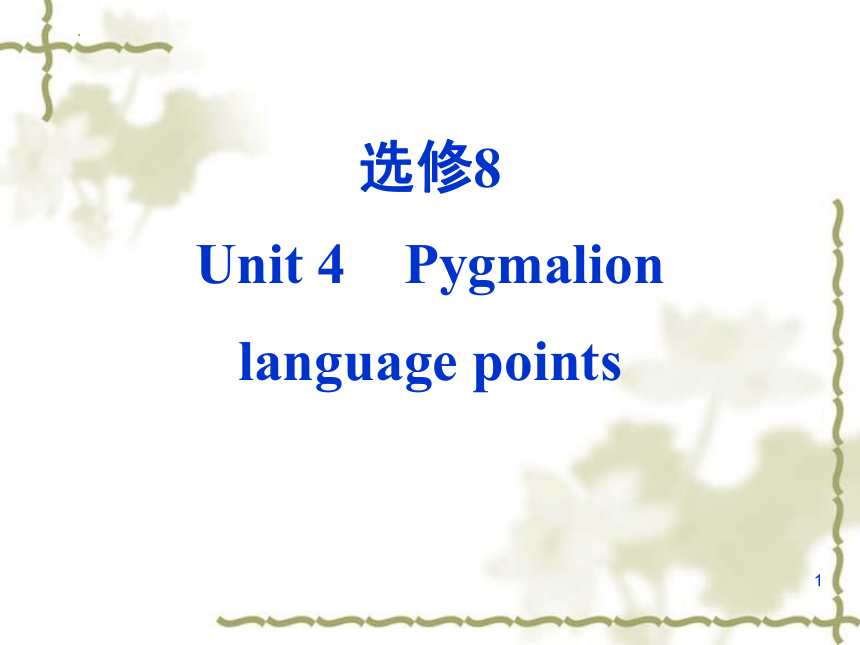
|
|
| 格式 | zip | ||
| 文件大小 | 217.9KB | ||
| 资源类型 | 教案 | ||
| 版本资源 | 人教版(新课程标准) | ||
| 科目 | 英语 | ||
| 更新时间 | 2022-03-29 00:00:00 | ||
图片预览

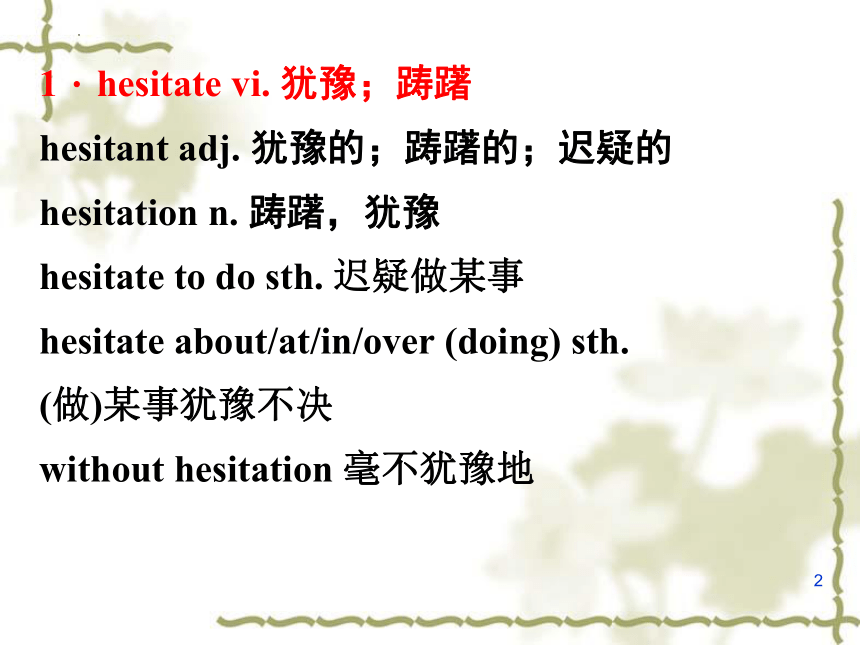
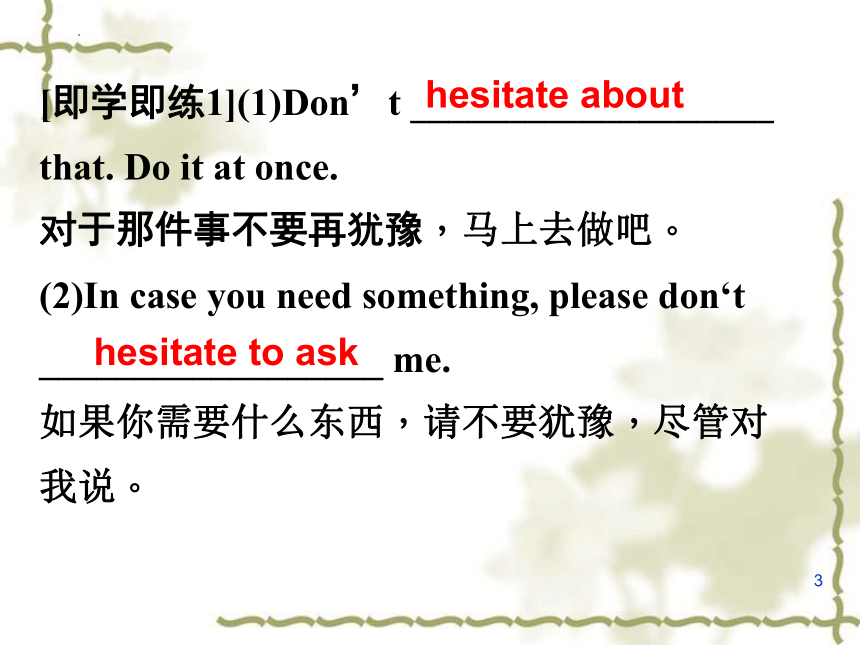
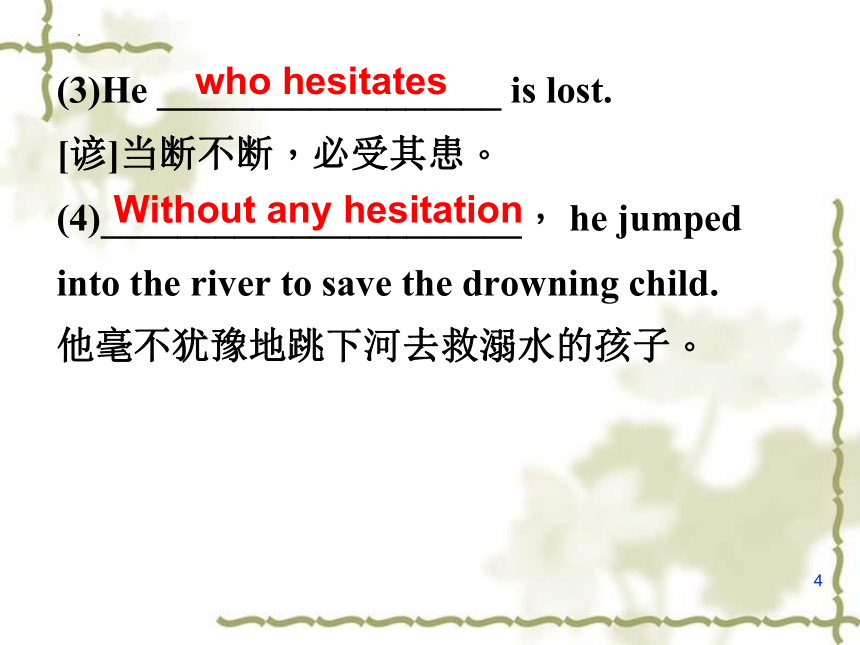
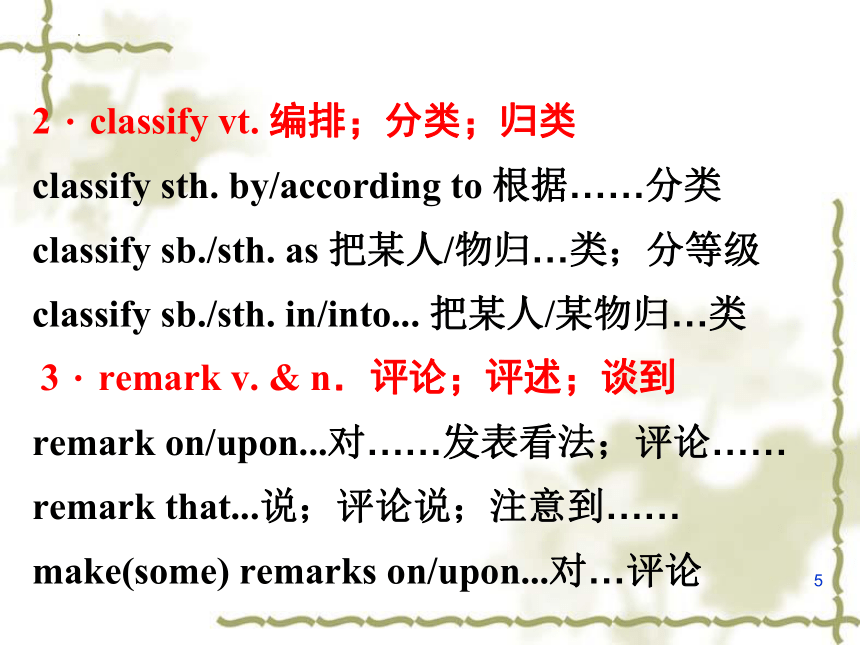
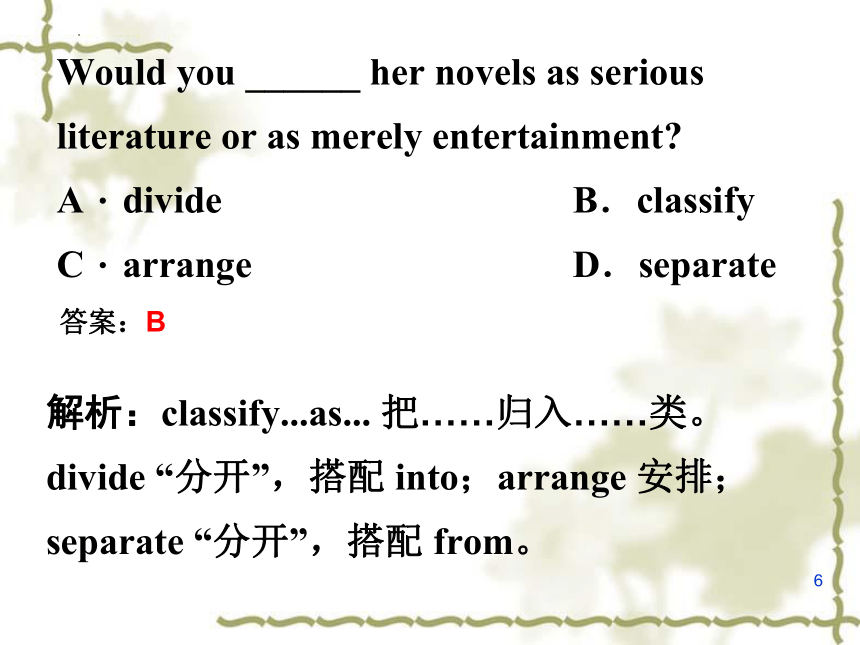
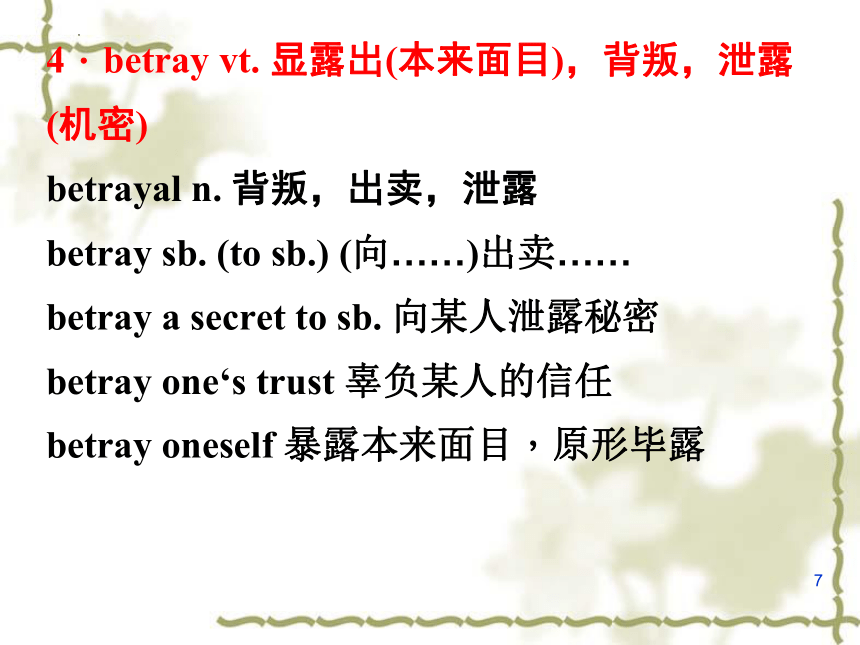
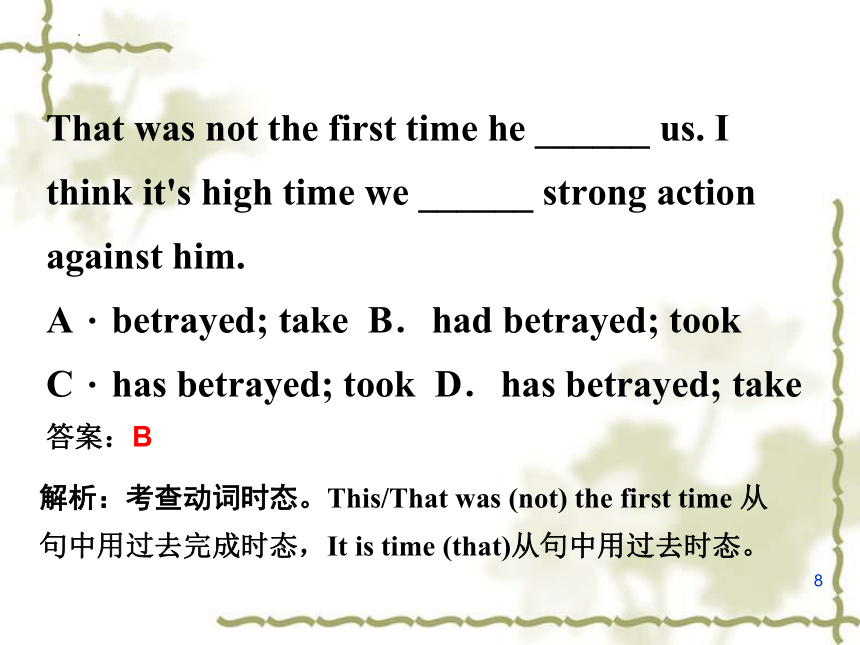
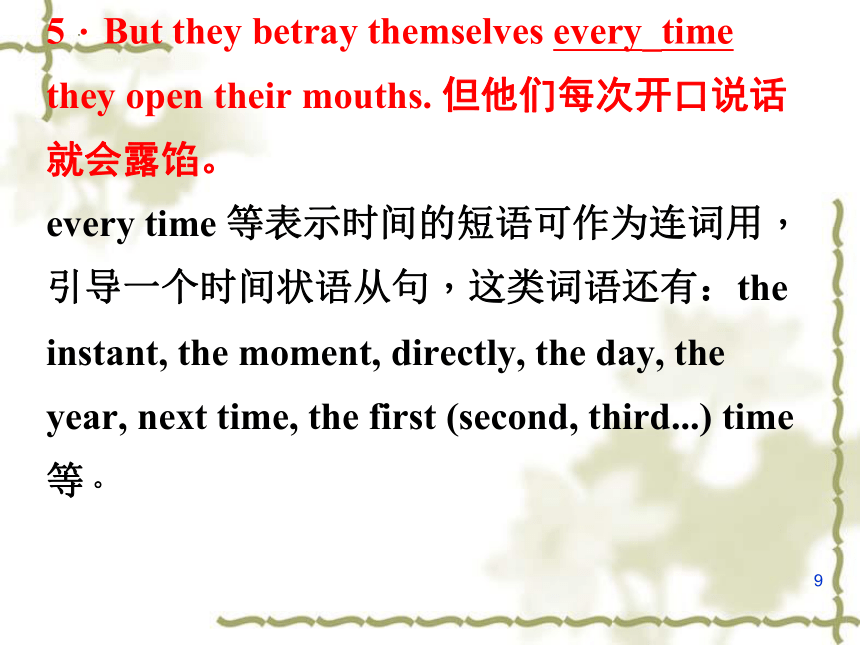
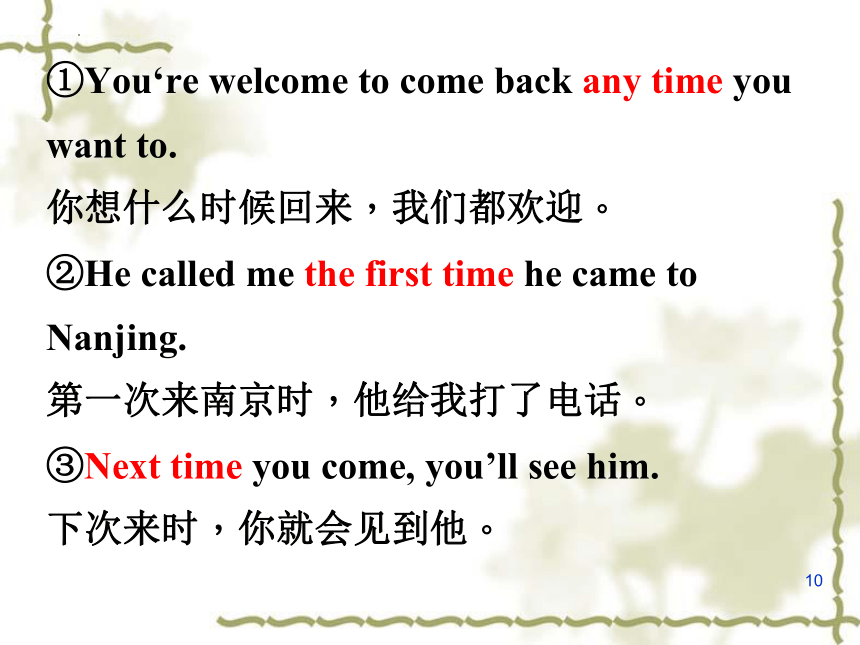
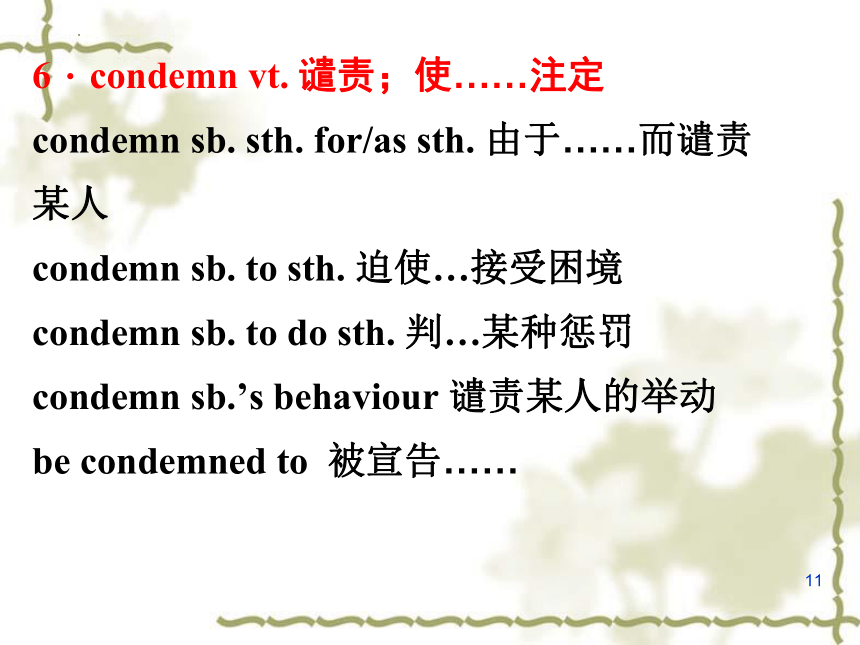
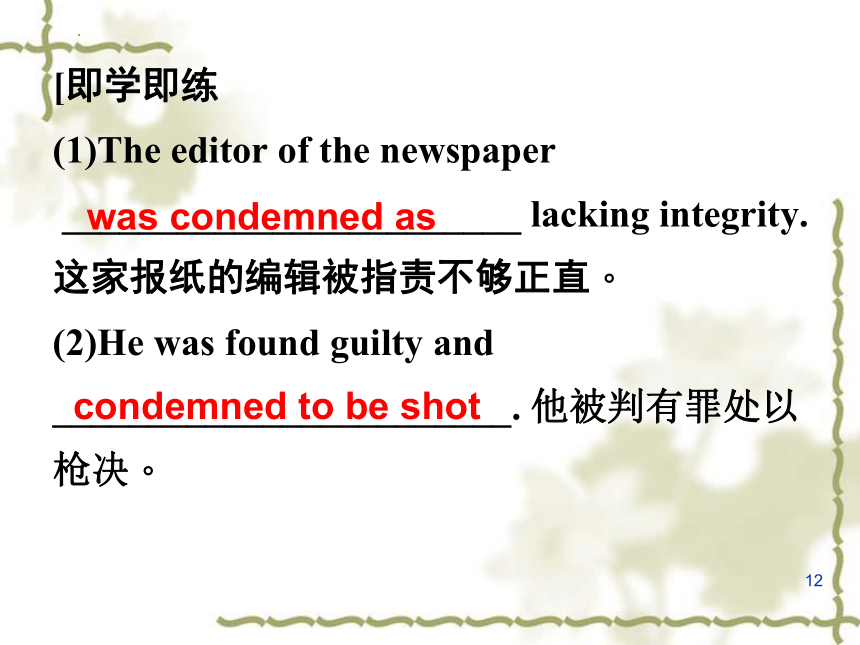
文档简介
(共48张PPT)
选修8 Unit 4 Pygmalionlanguage points1.hesitate vi. 犹豫;踌躇hesitant adj. 犹豫的;踌躇的;迟疑的hesitation n. 踌躇,犹豫hesitate to do sth. 迟疑做某事hesitate about/at/in/over (doing) sth.(做)某事犹豫不决without hesitation 毫不犹豫地[即学即练1](1)Don’t ___________________ that. Do it at once.对于那件事不要再犹豫,马上去做吧。(2)In case you need something, please don‘t__________________ me.如果你需要什么东西,请不要犹豫,尽管对我说。hesitate about hesitate to ask(3)He __________________ is lost.[谚]当断不断,必受其患。(4)______________________,he jumped into the river to save the drowning child.他毫不犹豫地跳下河去救溺水的孩子。who hesitatesWithout any hesitation2.classify vt. 编排;分类;归类classify sth. by/according to 根据……分类classify sb./sth. as 把某人/物归…类;分等级classify sb./sth. in/into... 把某人/某物归…类3.remark v. & n.评论;评述;谈到remark on/upon...对……发表看法;评论……remark that...说;评论说;注意到……make(some) remarks on/upon...对…评论Would you ______ her novels as serious literature or as merely entertainment A.divide B.classifyC.arrange D.separate答案:B解析:classify...as...把……归入……类。divide“分开”,搭配into;arrange安排;separate“分开”,搭配from。4.betray vt. 显露出(本来面目),背叛,泄露(机密)betrayal n. 背叛,出卖,泄露betray sb. (to sb.) (向……)出卖……betray a secret to sb. 向某人泄露秘密betray one‘s trust 辜负某人的信任betray oneself 暴露本来面目,原形毕露That was not the first time he ______ us. I think it's high time we ______ strong action against him.A.betrayed; take B.had betrayed; tookC.has betrayed; took D.has betrayed; take答案:B解析:考查动词时态。This/That was (not) the first time从句中用过去完成时态,It is time (that)从句中用过去时态。5.But they betray themselvesevery_timethey open their mouths. 但他们每次开口说话就会露馅。every time 等表示时间的短语可作为连词用,引导一个时间状语从句,这类词语还有:the instant, the moment, directly, the day, the year, next time, the first (second, third...) time 等。①You‘re welcome to come backany timeyou want to.你想什么时候回来,我们都欢迎。②He called methe first timehe came to Nanjing.第一次来南京时,他给我打了电话。③Next timeyou come, you’ll see him.下次来时,你就会见到他。6.condemn vt. 谴责;使……注定condemn sb. sth. for/as sth. 由于……而谴责某人condemn sb. to sth. 迫使…接受困境condemn sb. to do sth. 判…某种惩罚condemn sb.’s behaviour 谴责某人的举动be condemned to 被宣告……[即学即练(1)The editor of the newspaper________________________ lacking integrity.这家报纸的编辑被指责不够正直。(2)He was found guilty and ________________________. 他被判有罪处以枪决。was condemned as condemned to be shot7.辨析:overlook/ignore/neglect/omitoverlook指应该注意而未注意,意为“忽视”。ignore含有主动意味,侧重“不理睬”。neglect侧重因没看到或没考虑全面而“忽视”。omit“遗漏,忽略,忘记”,指由于疏忽而忘记,也可表示因不利或不好而被忽略等。8.acquaintance n. [C]认识的人,熟人;[U]认识,有交情;了解have acquaintance with sb. 与……认识,有交情have acquaintance with sth. 对……了解make sb.‘s acquaintance/make the acquaintance of sb.与某人初次相见、结识某人on first acquaintance 初次相见时[即学即练](1)I ________________________ at a party.我是在一个聚会上认识他的。(2)He has some little ____________________ the English language. 他稍微会一点儿英语。made his acquaintanceacquaintance withacquaintance/friend/companion(1)acquaintance熟人,相识的人;尤指在工作和事业中认识的人。(2)friend朋友;指关系密切、感情较深者。(3)companion同伴,伙伴;指共同参加某种活动或在某种情况下同甘共苦的人。练习:(1)a traveling ______________旅伴(2)a trusted ___________________知已(3)a nodding ________________点头之交(4)a ______________ in despair患难之交companionfriendacquaintancecompanion9.superior adj. 优秀的;优等的;较高的;上级的n. 上级,长官be superior to sb./sth.在品质、级别、重要性上更好或更高be inferior to 低于be senior to 比……年长(资深)be junior to 比……年轻(资浅)be prior to 比……优先[即学即练7](1)Show respect for ________________. 对我们的上级要尊敬。(2)His knowledge of French literature __________________ mine.他在法国文学方面比我强。(3)They __________________ number ______ us.他们在数量上超过我们。our superiors is superior toare superior intoBeethoven is my favorite musician. I regard him ______ other musicians.A.more superior to B.more superiorC.superior to D.superior than答案:C10.in terms of 就……来说,从……角度;根据,按照in terms of=with regard to, according to, in the light ofcome to terms 和解;妥协;让步come to terms with 甘心忍受be on good/bad terms with 与……关系很好(坏)in the long/short term 从长远(眼前)来看11.show...in...带/领……进来show sb. out领某人出去show sb. into领某人进入……show sb. around/round...领某人参观……show sb. to the door送某人到门口show off炫耀show up出席,到场on show在展出12.fade out(声音、画面)逐渐模糊;渐淡fade away消失,逐渐减弱;褪色fade in淡入;渐渐显示出;使渐强(指电影、电视中的画面与声音)fade up渐强(指电视、广播中的声音)die away指(声音)逐渐消逝die down指(声音)逐渐减弱,衰弱[即学即练11](1)The sound had ____________ /___________.声音已逐渐消失了。(2)It was dark and the noise ____________.天黑了,喧闹声逐渐消失了。(3)The shapes ___________ into the night.那些影子消失在夜色中。died awayfaded outdied downfaded away(1)It‘s raining heavily now,isn’t_it 使用反意疑问句需注意以下几点:(2)回答这类问题时,答案是肯定的用 yes,否定的用 no;但前面是否定的句子注意yes, no 的翻译He wasn‘t there that day, was he Yes, he was. (不,他在)No, he wasn’t (是的,他不在)反义疑问句(3)如果陈述部分中含有 no, never, hardly, scarcely, seldom 等词,后边要用肯定的疑问尾句。You have no classes tomorrow, have you You were hardly twelve then, were you 你那时几乎不到12岁,是吧?(4)当主语为 none, everyone, someone, no one 等时,正式语体中常用 he,非正式语体中常用 they。None of the boys can do it, can he Everyone enjoyed the party, didn‘t they (5)当主语为 nothing, something, anything, everything 等时,后面的主语多用 it。You think it is uncomfortable to sit on such a hard chair, ______?A.don't you B.do youC.isn't it D.is it答案:C解析:uncomfortable, unfair等意思是否定,但形式为肯定;而且you think是插入语。Ⅲ.完形填空Nowadays the whole world are worrying about a danger—global warming.In fact this began a long time ago. Yet not all of us seem to realize it.One day around 30 years ago,the nine million citizens of London heard sirens(a loud noise of warning made by a special machine) all over the town. Emergency services, the __1__,the police, doctors and nurses __2__ by, ready to go into action. In railway and underground stations, people read posters and __3__,telling them where to go and __4__ to do in the emergency.This was Exercise Floodcall. London wasn‘t flooded yet. But it is __5__ that it will be.In 1236 and 1663 London was __6__ flooded. In 1928, unluckily, quite a __7__ people living in Westminster, the heart of London, __8__ in floods. And in 1953, 100 people living on the eastern __9__,the London suburbs, were killed again in the floods. At last, the Great London Council(市政厅), is taking actions to __10__ this disaster happening again. But the flood __11__ were not built until the 1980s. And in the __12__,Londoners must be __13__. When it happens, 50underground stations will be underwater.Electricity,gas and phone services will be out of action. __14__ will be impassable.It will be impossible to __15__ any of the bridges between North and South London. __16__ -London will look like Venice.But Exercise Floodcall didn't cause __17__ among Londoners.Most people knew it was just a __18__ .One comment from a lady who was __19__ along the Embankment when the sirens sounded was,“It's a flood warning, isn't it The water doesn't look __20__ to me.”1.A.soldiers B.firemenC.engineers D.repairmen2.A.hurried B.wentC.watched D.stood3.A.books B.magazinesC.maps D.dictionaries4.A what B.howC.why D.which5.A.believable B.trueC.natural D.possible6.A.easily B.heavilyC.strongly D.poorly7.A.many B.fewC.lots D.plenty8.A.escaped B.killedC.survived D.drowned9.A.edge B.areaC.part D.district10.A.resist B.keepC.prevent D.object11.A.walls B.channelC.shelter D.fence12.A.future B.pastC.meantime D.end13.A.delighted B.preparedC.frightened D.encouraged14.A.Roads B.PowerC.Messages D.Traffic15.A.see B.passC.build D.cross16.A.Guess B.RememberC.Consider D.Imagine17.A.panic B.attentionC.notice D.care18.A.design B.planC.warning D.joke19.A.living B.walkingC.working D.studying20.A.deep B.highC.shallow D.wide答案及解析:本文讲述了全球越来越多的人所关注的问题——全球气候变暖不是近年才有的,而是由来已久的。1.A。根据前文的内容可以推断出此处选A。2.D。由后文的ready to go into action可以推断出此处选D。本题稍难。3.C。根据后文的where to go可知此处选C。4.A。“疑问词+动词不定式”结构中,疑问词做不定式的逻辑宾语,指物,故选A。5.D。此两句意思是:伦敦还没有发洪水,但是将来可能会,故选D。6.B。所填词修饰flooded,用副词,意思是“严重地”,故选B。7.B。句意为:有相当多的人住在威斯敏斯特,故选B。8.D。根据空后的in floods可知此处选D。本题稍难。9.A。由后文的the London suburbs可以推断出此处选A。10.C。根据后文的happening again可知所填词构成prevent sb/sth(from) doing sth句型,故选C。11.A。句意为:但是防水墙直到20世纪80年代才建成,故选A。12.C。in the meantime同时,故选C。13.B。句意为:伦敦人必须做好准备。故选B。14.A。根据本句中impassible(不能通过的)的意思可知此处选A。15.D。由本句中的bridge可以推断出此处选D。16.D。破折号表示解释,后一句是作者的想象,故此处选D。17.A。本句意思是:这次防洪演习没有造成恐慌,故选A。18.C。根据后文的It‘s a flood warning, isn’t it?可知此处选C。19.B。根据空后的along(沿着)可知此处选B。20.B。由前文的flood可知此处选B。Ⅳ.短文改错When I first learned to write in English, I ran into 1.____________________________much difficulties. The main problem was that I always thought 2._________________________in Chinese and tried to translate anything into English. 3.___________________My teacher advised me to keep my diary. I followed her 4.___________________________√much→manyanything→everything第二个my→aadvice and should put down 100 words or so each day. 5._________________________Soon I began to enjoy talk to myself as I was6.____________________learning to express me in simple English. One day I wrote 7.____________________a story and showed to my teacher. He liked it very much 8.___________________去掉shouldtalk→talkingme→myselfto前加itand reads it to the class. All said that the story was 9.________________________a good one. Their word were a great encouragement to me. 10.______________________reads→readword→words
选修8 Unit 4 Pygmalionlanguage points1.hesitate vi. 犹豫;踌躇hesitant adj. 犹豫的;踌躇的;迟疑的hesitation n. 踌躇,犹豫hesitate to do sth. 迟疑做某事hesitate about/at/in/over (doing) sth.(做)某事犹豫不决without hesitation 毫不犹豫地[即学即练1](1)Don’t ___________________ that. Do it at once.对于那件事不要再犹豫,马上去做吧。(2)In case you need something, please don‘t__________________ me.如果你需要什么东西,请不要犹豫,尽管对我说。hesitate about hesitate to ask(3)He __________________ is lost.[谚]当断不断,必受其患。(4)______________________,he jumped into the river to save the drowning child.他毫不犹豫地跳下河去救溺水的孩子。who hesitatesWithout any hesitation2.classify vt. 编排;分类;归类classify sth. by/according to 根据……分类classify sb./sth. as 把某人/物归…类;分等级classify sb./sth. in/into... 把某人/某物归…类3.remark v. & n.评论;评述;谈到remark on/upon...对……发表看法;评论……remark that...说;评论说;注意到……make(some) remarks on/upon...对…评论Would you ______ her novels as serious literature or as merely entertainment A.divide B.classifyC.arrange D.separate答案:B解析:classify...as...把……归入……类。divide“分开”,搭配into;arrange安排;separate“分开”,搭配from。4.betray vt. 显露出(本来面目),背叛,泄露(机密)betrayal n. 背叛,出卖,泄露betray sb. (to sb.) (向……)出卖……betray a secret to sb. 向某人泄露秘密betray one‘s trust 辜负某人的信任betray oneself 暴露本来面目,原形毕露That was not the first time he ______ us. I think it's high time we ______ strong action against him.A.betrayed; take B.had betrayed; tookC.has betrayed; took D.has betrayed; take答案:B解析:考查动词时态。This/That was (not) the first time从句中用过去完成时态,It is time (that)从句中用过去时态。5.But they betray themselvesevery_timethey open their mouths. 但他们每次开口说话就会露馅。every time 等表示时间的短语可作为连词用,引导一个时间状语从句,这类词语还有:the instant, the moment, directly, the day, the year, next time, the first (second, third...) time 等。①You‘re welcome to come backany timeyou want to.你想什么时候回来,我们都欢迎。②He called methe first timehe came to Nanjing.第一次来南京时,他给我打了电话。③Next timeyou come, you’ll see him.下次来时,你就会见到他。6.condemn vt. 谴责;使……注定condemn sb. sth. for/as sth. 由于……而谴责某人condemn sb. to sth. 迫使…接受困境condemn sb. to do sth. 判…某种惩罚condemn sb.’s behaviour 谴责某人的举动be condemned to 被宣告……[即学即练(1)The editor of the newspaper________________________ lacking integrity.这家报纸的编辑被指责不够正直。(2)He was found guilty and ________________________. 他被判有罪处以枪决。was condemned as condemned to be shot7.辨析:overlook/ignore/neglect/omitoverlook指应该注意而未注意,意为“忽视”。ignore含有主动意味,侧重“不理睬”。neglect侧重因没看到或没考虑全面而“忽视”。omit“遗漏,忽略,忘记”,指由于疏忽而忘记,也可表示因不利或不好而被忽略等。8.acquaintance n. [C]认识的人,熟人;[U]认识,有交情;了解have acquaintance with sb. 与……认识,有交情have acquaintance with sth. 对……了解make sb.‘s acquaintance/make the acquaintance of sb.与某人初次相见、结识某人on first acquaintance 初次相见时[即学即练](1)I ________________________ at a party.我是在一个聚会上认识他的。(2)He has some little ____________________ the English language. 他稍微会一点儿英语。made his acquaintanceacquaintance withacquaintance/friend/companion(1)acquaintance熟人,相识的人;尤指在工作和事业中认识的人。(2)friend朋友;指关系密切、感情较深者。(3)companion同伴,伙伴;指共同参加某种活动或在某种情况下同甘共苦的人。练习:(1)a traveling ______________旅伴(2)a trusted ___________________知已(3)a nodding ________________点头之交(4)a ______________ in despair患难之交companionfriendacquaintancecompanion9.superior adj. 优秀的;优等的;较高的;上级的n. 上级,长官be superior to sb./sth.在品质、级别、重要性上更好或更高be inferior to 低于be senior to 比……年长(资深)be junior to 比……年轻(资浅)be prior to 比……优先[即学即练7](1)Show respect for ________________. 对我们的上级要尊敬。(2)His knowledge of French literature __________________ mine.他在法国文学方面比我强。(3)They __________________ number ______ us.他们在数量上超过我们。our superiors is superior toare superior intoBeethoven is my favorite musician. I regard him ______ other musicians.A.more superior to B.more superiorC.superior to D.superior than答案:C10.in terms of 就……来说,从……角度;根据,按照in terms of=with regard to, according to, in the light ofcome to terms 和解;妥协;让步come to terms with 甘心忍受be on good/bad terms with 与……关系很好(坏)in the long/short term 从长远(眼前)来看11.show...in...带/领……进来show sb. out领某人出去show sb. into领某人进入……show sb. around/round...领某人参观……show sb. to the door送某人到门口show off炫耀show up出席,到场on show在展出12.fade out(声音、画面)逐渐模糊;渐淡fade away消失,逐渐减弱;褪色fade in淡入;渐渐显示出;使渐强(指电影、电视中的画面与声音)fade up渐强(指电视、广播中的声音)die away指(声音)逐渐消逝die down指(声音)逐渐减弱,衰弱[即学即练11](1)The sound had ____________ /___________.声音已逐渐消失了。(2)It was dark and the noise ____________.天黑了,喧闹声逐渐消失了。(3)The shapes ___________ into the night.那些影子消失在夜色中。died awayfaded outdied downfaded away(1)It‘s raining heavily now,isn’t_it 使用反意疑问句需注意以下几点:(2)回答这类问题时,答案是肯定的用 yes,否定的用 no;但前面是否定的句子注意yes, no 的翻译He wasn‘t there that day, was he Yes, he was. (不,他在)No, he wasn’t (是的,他不在)反义疑问句(3)如果陈述部分中含有 no, never, hardly, scarcely, seldom 等词,后边要用肯定的疑问尾句。You have no classes tomorrow, have you You were hardly twelve then, were you 你那时几乎不到12岁,是吧?(4)当主语为 none, everyone, someone, no one 等时,正式语体中常用 he,非正式语体中常用 they。None of the boys can do it, can he Everyone enjoyed the party, didn‘t they (5)当主语为 nothing, something, anything, everything 等时,后面的主语多用 it。You think it is uncomfortable to sit on such a hard chair, ______?A.don't you B.do youC.isn't it D.is it答案:C解析:uncomfortable, unfair等意思是否定,但形式为肯定;而且you think是插入语。Ⅲ.完形填空Nowadays the whole world are worrying about a danger—global warming.In fact this began a long time ago. Yet not all of us seem to realize it.One day around 30 years ago,the nine million citizens of London heard sirens(a loud noise of warning made by a special machine) all over the town. Emergency services, the __1__,the police, doctors and nurses __2__ by, ready to go into action. In railway and underground stations, people read posters and __3__,telling them where to go and __4__ to do in the emergency.This was Exercise Floodcall. London wasn‘t flooded yet. But it is __5__ that it will be.In 1236 and 1663 London was __6__ flooded. In 1928, unluckily, quite a __7__ people living in Westminster, the heart of London, __8__ in floods. And in 1953, 100 people living on the eastern __9__,the London suburbs, were killed again in the floods. At last, the Great London Council(市政厅), is taking actions to __10__ this disaster happening again. But the flood __11__ were not built until the 1980s. And in the __12__,Londoners must be __13__. When it happens, 50underground stations will be underwater.Electricity,gas and phone services will be out of action. __14__ will be impassable.It will be impossible to __15__ any of the bridges between North and South London. __16__ -London will look like Venice.But Exercise Floodcall didn't cause __17__ among Londoners.Most people knew it was just a __18__ .One comment from a lady who was __19__ along the Embankment when the sirens sounded was,“It's a flood warning, isn't it The water doesn't look __20__ to me.”1.A.soldiers B.firemenC.engineers D.repairmen2.A.hurried B.wentC.watched D.stood3.A.books B.magazinesC.maps D.dictionaries4.A what B.howC.why D.which5.A.believable B.trueC.natural D.possible6.A.easily B.heavilyC.strongly D.poorly7.A.many B.fewC.lots D.plenty8.A.escaped B.killedC.survived D.drowned9.A.edge B.areaC.part D.district10.A.resist B.keepC.prevent D.object11.A.walls B.channelC.shelter D.fence12.A.future B.pastC.meantime D.end13.A.delighted B.preparedC.frightened D.encouraged14.A.Roads B.PowerC.Messages D.Traffic15.A.see B.passC.build D.cross16.A.Guess B.RememberC.Consider D.Imagine17.A.panic B.attentionC.notice D.care18.A.design B.planC.warning D.joke19.A.living B.walkingC.working D.studying20.A.deep B.highC.shallow D.wide答案及解析:本文讲述了全球越来越多的人所关注的问题——全球气候变暖不是近年才有的,而是由来已久的。1.A。根据前文的内容可以推断出此处选A。2.D。由后文的ready to go into action可以推断出此处选D。本题稍难。3.C。根据后文的where to go可知此处选C。4.A。“疑问词+动词不定式”结构中,疑问词做不定式的逻辑宾语,指物,故选A。5.D。此两句意思是:伦敦还没有发洪水,但是将来可能会,故选D。6.B。所填词修饰flooded,用副词,意思是“严重地”,故选B。7.B。句意为:有相当多的人住在威斯敏斯特,故选B。8.D。根据空后的in floods可知此处选D。本题稍难。9.A。由后文的the London suburbs可以推断出此处选A。10.C。根据后文的happening again可知所填词构成prevent sb/sth(from) doing sth句型,故选C。11.A。句意为:但是防水墙直到20世纪80年代才建成,故选A。12.C。in the meantime同时,故选C。13.B。句意为:伦敦人必须做好准备。故选B。14.A。根据本句中impassible(不能通过的)的意思可知此处选A。15.D。由本句中的bridge可以推断出此处选D。16.D。破折号表示解释,后一句是作者的想象,故此处选D。17.A。本句意思是:这次防洪演习没有造成恐慌,故选A。18.C。根据后文的It‘s a flood warning, isn’t it?可知此处选C。19.B。根据空后的along(沿着)可知此处选B。20.B。由前文的flood可知此处选B。Ⅳ.短文改错When I first learned to write in English, I ran into 1.____________________________much difficulties. The main problem was that I always thought 2._________________________in Chinese and tried to translate anything into English. 3.___________________My teacher advised me to keep my diary. I followed her 4.___________________________√much→manyanything→everything第二个my→aadvice and should put down 100 words or so each day. 5._________________________Soon I began to enjoy talk to myself as I was6.____________________learning to express me in simple English. One day I wrote 7.____________________a story and showed to my teacher. He liked it very much 8.___________________去掉shouldtalk→talkingme→myselfto前加itand reads it to the class. All said that the story was 9.________________________a good one. Their word were a great encouragement to me. 10.______________________reads→readword→words
